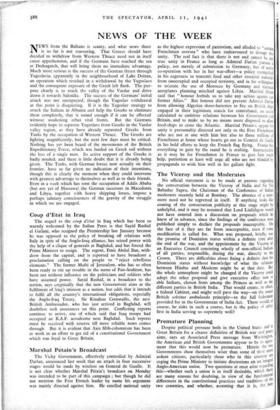The Viceroy and the Moderates
No official statement is to be made at present regarding the conversation between the Viceroy of India and Sir Tel Bahadur Sapru, the Chairman of the Conference of Indian moderates recently held at Bombay. The absence of a state- ment need not be regretted in itself. If anything looks like coming of the conversation publicity at this stage might be unhelpful, and it may be assumed that Lord Linlithgow would not have entered into a discussion on proposals which he knew of in advance, since the findings of the conference were published simply to declare the proposals inacceptable. On the face of it they are far from inacceptable, even if sonx modification is called for. What was proposed, briefly, was the promise of Dominion status within a definite time after the end of the war, and the appointment by the Viceroy of an Executive Council consisting wholly of non-official Indians of all parties, responsible, during the war, directly to the Crown. There are difficulties about fixing a definite date for Dominion status without knowledge of what the relations between Hindus and Moslems might be at that date. But the whole atmosphere might be changed if the Viceroy could adopt the other proposal and give executive office now 10 able Indians, chosen from among the Princes as well as the different parties in British India. That would create, in duct, a federal Cabinet, and might well pave the way—on the sound British solvitur ambulando principle—to the full federation provided for in the Government of India Act. There would, of course, be risks in such a course, but is the policy of safely first in India serving us supremely well?






























 Previous page
Previous page